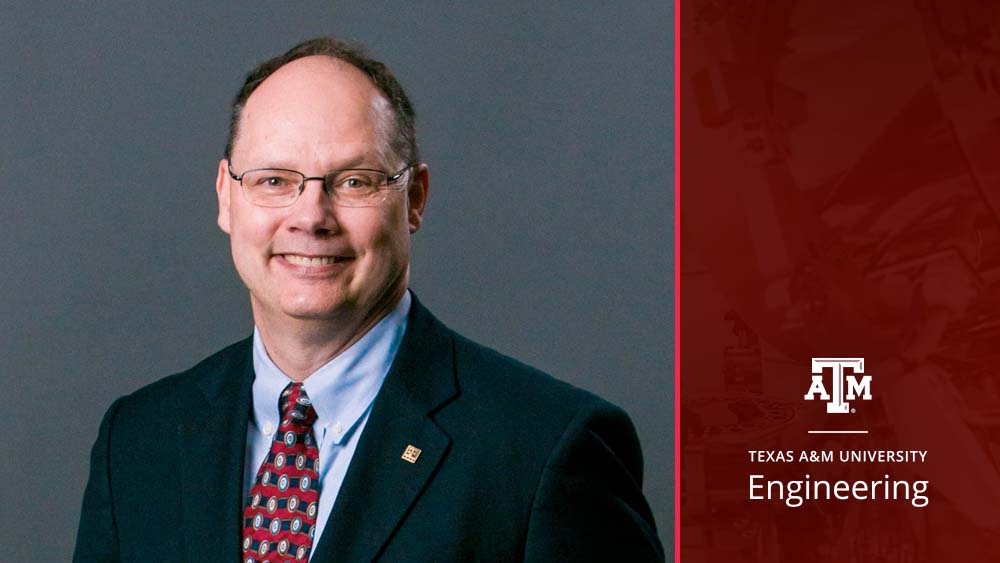
Dr. Gerard Coté recently celebrated 30 years with the biomedical engineering program at Texas A&M University, and he expects to continue to make an impact for years to come.
Coté joined what was then called the bioengineering department as an assistant professor in 1991.
“I didn't think I would be here that long because you never know if you're going to make tenure when you first start out,” Coté said. “You try your best and see how the chips fall. But I think that being with (Texas) A&M has overall been fantastic.”
When Coté first started, he had an entrepreneurial angle along with the academic one.
“Early on, I decided to take a leave of absence and work for a small company in California,” Coté said. “Although back then some of the administration thought it might be counterproductive to tenure, I was able to get that experience and still satisfy the research, teaching, mentoring and service required for making tenure.”
Based on that experience, he also started several companies early in his career, two of which are still running today, and one has been bought out by a larger medical device company.
Coté’s research in the development of macro-scale to nano-scale biomedical systems and point-of-care devices has had a great impact in the biomedical field. He founded the Center for Remote Health Technologies and Systems and the National Science Foundation-funded Precise Advanced Health Technologies and Systems for Underserved Populations Engineering Research Center, known as PATHS-UP. There, interdisciplinary researchers aim to engage with patients and health care providers in these communities toward developing creative ways to combat diabetes and cardiovascular disease.
He and his team develop innovative ways to monitor patients through unique wearable and handheld diagnostic and monitoring devices and use modeling to understand the data that may be used for behavior modification. Beyond developing the devices, his team innovates solutions for better health in these communities such as prescribing food, like fresh vegetables, as a drug and then assessing whether there is a positive outcome like reducing the hemoglobin A1c, a known biomarker that when elevated is an indicator of poor control of diabetes.
A career in biomedical engineering has allowed Coté to facilitate dialogues between doctors, engineers, computational experts, behavioral psychologists and a variety of experts in biomaterials, biomechanics and more.
“If I can facilitate it and be a part of it and contribute my expertise, that’s ideal,” Coté said. “I think everybody has strengths and weaknesses. If I do not have the expertise, then I go find somebody that has that expertise and collaborate.”
Coté has sought to fulfill his two passions in all parts of his career — make an impact and be a mentor.
“There's two ways to make an impact,” he said. “One is to advance the research field through publications. I call that fundamental research, and I've done that, and I continue to do that. But then I feel like I need to take a little step further and actually impact clinical medicine or clinical workflow through translational research advances. You can only go so far in the translational process at the university, then you either have to spin out a company or license the technical advancement to an existing company.
“The thing I really believe may have the strongest legacy is the mentoring,” Coté said. “As with most senior faculty, you win a lot of awards as you progress in your career, but probably the award I'm most proud of is the graduate mentoring award from the university. To me, where I love to spend a lot of time, energy and effort is mentoring people across the board.”
Now, with his share of academic “children and grandchildren,” Coté continues to help his students find their own strengths, learn to work with others with varying backgrounds and disciplines, and help them mitigate their weaknesses to make the greatest impact possible.
“It's all about helping others and how can you do that in an effective way,” he said. “Whether that's mentoring students that go on to do wonderful things or directly influencing the field by performing fundamental research that gets published or by performing translational research that ends up being licensed or spun out to a company. To me, whatever you do, strive to positively impact the world.”